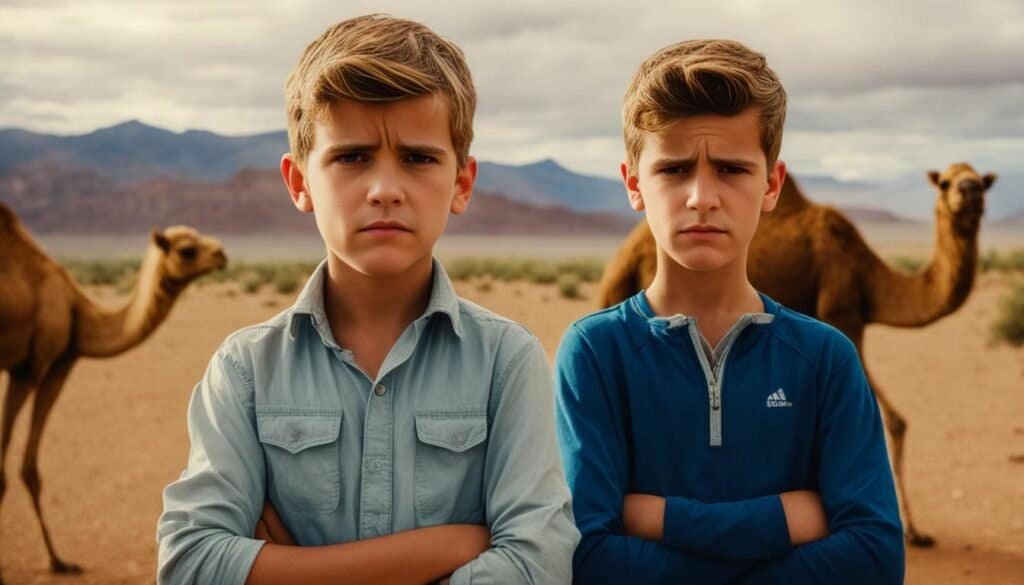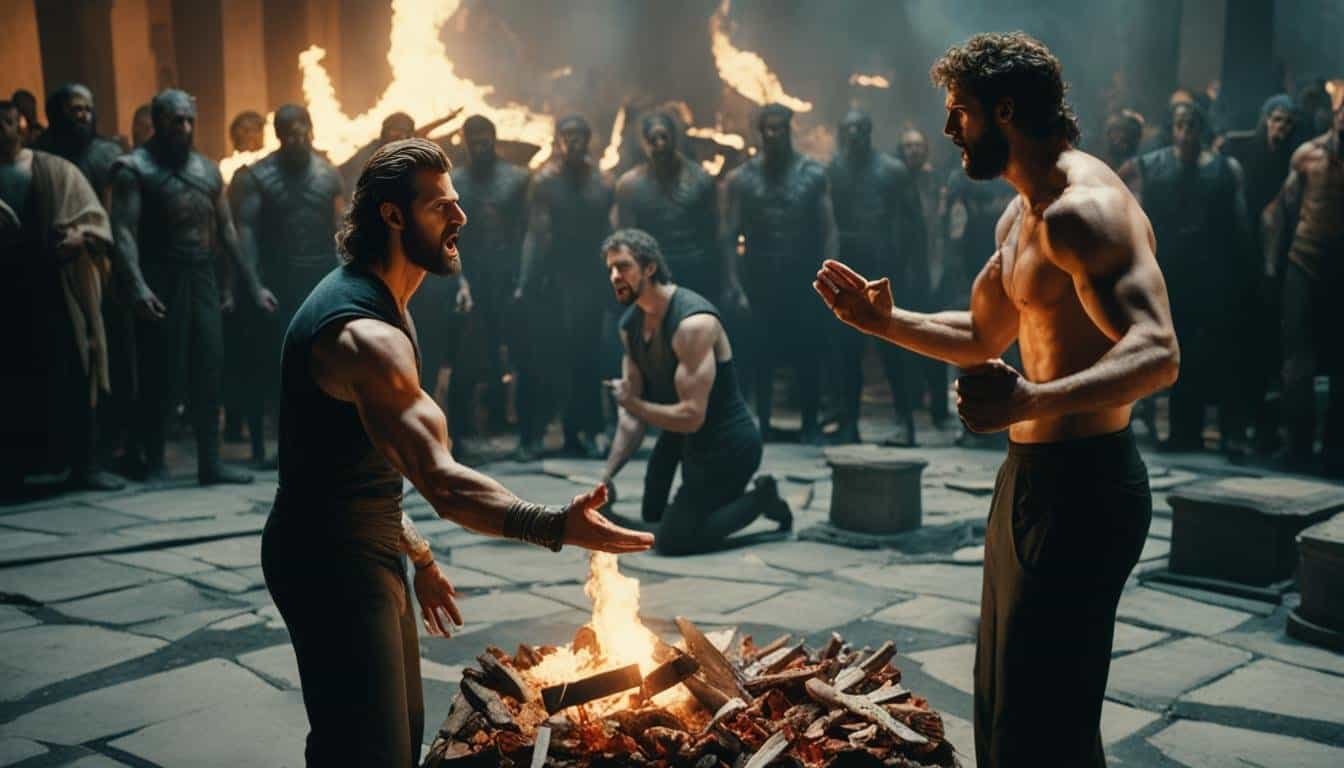Curious about how conflicts within families have left a mark on biblical history? From brothers fighting to shocking betrayals, the book of Genesis includes many intense disputes. Let’s explore these stories and the important lessons they teach us.
Key Takeaways:
- Explore the intense family feuds that unfolded in the book of Genesis.
- Discover the consequences of sibling rivalries and conflicts among relatives.
- Reflect on the lessons of forgiveness, redemption, and reconciliation.
- Understand how these family feuds shaped the trajectory of biblical history.
- Uncover the stories of healing and restoration that emerged despite the conflicts.
Cain and Abel: The First Family Feud
Genesis tells us about many family fights that changed history. The story of Cain and Abel is one such tale. It shows us what happens when jealousy and anger take over, leading to tragic consequences.
Cain, the farmer, brings fruits from his land to God. Abel, a shepherd, offers a lamb. God prefers Abel’s gift, making Cain very jealous and bitter.
“And the Lord said unto Cain, ‘Why are you angry? Why has your countenance fallen? If you do well, will you not be accepted? And if you do not do well, sin lies at the door. And its desire is for you, but you should rule over it.'” – Genesis 4:6-7
God warns Cain about his feelings, tipping him to control them. But Cain’s jealousy grows, and he ends up killing Abel in the field.
This terrible action costs Abel’s life and brings a curse on Cain. God declares,
“So now you are cursed from the earth, which has opened its mouth to receive your brother’s blood from your hand. When you till the ground, it shall no longer yield its strength to you. A fugitive and a vagabond you shall be on the earth.” – Genesis 4:11-12
Cain’s choices lead to awful outcomes, starting a cycle of violence and breakups within families. His account warns us about dealing with misunderstandings and building strong family bonds.
Cain and Abel’s story strikes a chord with people from various ages and faiths. It explores deep emotions and the potential for evil that everyone carries.
Cain and Abel’s story invites us to reflect on our lives and bonds, showing the effect of jealousy and anger. It encourages choosing love, forgiveness, and restoration to break the violence pattern and bring family members together.
Isaac and Ishmael: Sibling Rivalry
The tale of Isaac and Ishmael is unique among biblical family stories. They were half-brothers born to different mothers, creating a complex family dynamic. This led to a strained relationship from the start.
Their fathers, Abraham and Sarah, added to the conflict through favoritism and jealousy. Isaac, the chosen one, was promised to inherit God’s covenant. This left Ishmael feeling cast aside and intensified their rivalry.
“And Sarah saw the son of Hagar the Egyptian, whom she had borne to Abraham, mocking.
Therefore she said to Abraham, ‘Cast out this bondwoman and her son; for the son of this bondwoman shall not be heir with my son, namely with Isaac.'” (Genesis 21:9-10)
This rivalry’s impact was huge. Isaac’s line led to the Israelites, while Ishmael was the ancestor of the Ishmaelites. Despite having a strained relationship, their descendants continued to have conflicts throughout history, shaping the Middle East.
The lesson from their story includes the destructive nature of sibling rivalry and the importance of forgiveness. Isaac and Ishmael united to bury Abraham, showing that peace is always a possibility. This act highlights the power of overcoming conflicts.
Their story warns us about the risks of family division. It stresses the importance of finding common ground to prevent long-lasting impacts. Sibling rivalries can carry on for generations, influencing broader communities.
The Descendants of Isaac and Ishmael
To understand the rivalry’s impact, we need to look at their descendants.
| Descendants of Isaac | Descendants of Ishmael |
|---|---|
| Jacob (Israel), father of the Twelve Tribes of Israel | Twelve princes, including Nebaioth, Kedar, and Adbeel |
| The Israelite nation | The Ishmaelites, known for their involvement in trade and caravan routes |
Isaac’s descendants shaped biblical history, while the Ishmaelites were known for their trade and travel. Their rivalry continues to influence the Middle East to this day.

Next, we will delve into the story of Jacob and Esau’s stolen blessing. It is a tale of dramatic events between twin brothers and the lasting effects of their rivalry. Stay tuned for more.
Jacob and Esau: A Stolen Blessing
In the book of Genesis, we find the tale of twin brothers, Jacob and Esau. Their story is full of rivalry and deceit over a stolen blessing. It reminds us how our choices can have big consequences.
Jacob and Esau were brothers with very different personalities. Esau, the older one, loved the outdoors and was his father’s favorite. Jacob was more quiet and favored by his mother.
A key moment came when Esau returned from hunting very hungry. He found Jacob had made a lentil stew. In his hunger, Esau traded his birthright to Jacob for a meal.
And Esau said to Jacob, “Please feed me with that same red stew, for I am weary.” Therefore his name was called Edom.
This hasty exchange had lasting effects. Isaac, their father, was getting old and wanted to bless Esau. But, Jacob and Rebecca tricked Isaac into blessing Jacob instead, causing deep anger in Esau.
To escape Esau’s anger, Jacob had to leave home. He went to work for his uncle, facing many hard times.
The Consequences of Deceit
The story underscores the price of deceit. Jacob’s actions not only hurt his brother but also led to his own exile. Such deceit can severely harm relationships.
It also set off ongoing conflict between Jacob’s descendants, the Israelites, and Esau’s, the Edomites. This rivalry lasted for many generations.
Lessons from Jacob and Esau
Jacob and Esau’s tale is a warning about deceit and its fallout. It shows how selfish choices can break apart families and lead to long-standing conflicts.
Still, it points to a path of redemption. Jacob and Esau eventually forgave each other. Their story is a testament to the power of forgiveness and moving on.
This biblical story prompts us to self-reflect. It urges us to work towards reconciliation and forgiveness, even when facing deep hurts and betrayals.
Leah and Rachel: Rival Sisters
Leah and Rachel, two important women from the book of Genesis, show us a story of sibling rivalry. They were sisters who wanted the same man, Jacob, for themselves. Despite their love for each other, they found themselves in constant competition.
Leah was older and considered less attractive. She was known for her “weak eyes.” Rachel, on the other hand, was young and very beautiful. Jacob fell deeply in love with Rachel at first sight.
Both sisters wanted Jacob’s love desperately. This led to a series of challenges in their family. Their quest for love played a huge role in the story of Jacob and the future of the Israelites.
“Leah’s eyes may have been weak, but her determination was indomitable. Rachel’s beauty was captivating, but her jealousy simmered beneath the surface.”
Leah, in her yearning for Jacob’s approval, gave birth to many children. She hoped this would make Jacob love her more. Meanwhile, Rachel, who couldn’t have children, found other ways to try to win Jacob’s heart.
They were in a constant struggle to be the best, trying to get Jacob’s love any way they could. This competition influenced their family’s future in many ways.

Leah’s Children and Rachel’s Desperation
Leah’s firstborn son, Reuben, brought her great joy. She hoped that through him, she would gain Jacob’s full love. But her happiness was short. Rachel’s envy drove her to give her maid, Bilhah, to Jacob, who then had two children with her.
Not wanting to lose, Leah gave her maid, Zilpah, to Jacob. Zilpah also had two children. This cycle of jealousy and rivalry kept going.
The Fruits of Rivalry
This competition led to twelve sons being born to Jacob. These sons became the founders of the twelve tribes of Israel. So, Leah and Rachel’s rivalry directly impacted the complex history of the Israelites.
Out of this struggle came great leaders like Judah, who was a direct ancestor of King David and Jesus. It also set the stage for future conflicts among the tribes of Israel.
Famously, Leah and Rachel’s competition shaped important events in the Bible. In doing this, they highlight the sometimes surprising and powerful effects of our actions.
| Leah | Rachel |
|---|---|
| Desperately sought Jacob’s love | Favored wife of Jacob |
| Conceived multiple children to win Jacob’s heart | Used maids as surrogates to bear children for Jacob |
| Mother of Reuben, Judah, and other tribe leaders | Mother of Joseph and Benjamin |
| Interactions with Rachel sparked competition and envy | Endured years of barrenness and deep longing |
Joseph and His Brothers: Jealousy and Betrayal
We’re diving into the story of Joseph and his brothers, full of jealousy and betrayal. It shows how these feelings can really shake up a family.
Joseph was the favorite son, which made his brothers jealous. They were so bitter, they wanted to get rid of him.
“Come now, let us plot against him and see what will become of his dreams,” they said, driven by jealousy.
So, they sold Joseph into slavery. This broke his freedom and his connection to them. But this was just the start of a much bigger story.
Even in slavery, Joseph’s faith and some twists of fate lifted him up. He became a top advisor in Egypt, where his brothers eventually needed his help.
Instead of revenge, Joseph chose to forgive his brothers. This was a huge turning point. It shows that forgiveness can heal even the deepest wounds.
Table: Joseph’s Journey
Lot and Abraham: A Peaceful Separation
Let’s talk about Lot and Abraham. They were relatives who decided to part ways peacefully. Their choice had a big impact not just on them, but on future families too.
Lot and Abraham had a lot of animals that needed space. They knew they had to find a way to keep the peace. So, they decided to split up. This way, they could still do well without their animals fighting over space.
“And Abram said unto Lot, Let there be no strife, I pray thee, between me and thee, and between my herdmen and thy herdmen; for we be brethren.” – Genesis 13:8
Abraham valued family more than winning arguments. He made sure they parted on good terms. Instead of picking fights, he chose family harmony with Lot.
Seeing how important peace was, Abraham let Lot choose where to live first. Lot picked the lush Jordan Valley. Abraham was fine with that and lived in Canaan. This fair agreement kept peace between them.
Thanks to their kind split, they both did well in their new homes. It was a good choice for them. But, soon they faced different problems because of their decision.
After Lot moved to Sodom, trouble found him. Abraham stepped in to save him when Sodom was in danger. This showed how much family meant to him. He wouldn’t let anything happen to Lot.
The peace between them didn’t last. Tough times came for Lot and Abraham. But, because of this peace, stories of courage and love were born. Their story shows us how important peace is and how it brings good things.

Learning from Lot and Abraham’s story is wise. It teaches us about choosing peace over arguments. Such decisions can bless us and protect us too. This way, we can face hard times together, showing grace and unity.
Hagar and Sarah: Conflict in the Household
In Abraham’s household, Hagar and Sarah were central figures in a bitter conflict. Hagar, an Egyptian maidservant, and Sarah, Abraham’s wife, both sought to find their place and show their importance.
As the conflict grew, it affected the future of their family. It wasn’t just a fight between them; it represented issues of power and identity. Their struggle showed how complex relationships can be.
“You are responsible for the wrong I am suffering!” Sarah accused Abraham of causing issues between them (Genesis 16:5). This shows how intense the conflict was and how it hurt both women.
Hagar and Sarah’s shared link, Ishmael, added to their conflict. Because Sarah couldn’t have children, she was jealous and treated Hagar badly.
“When she (Hagar) knew she was pregnant, she began to despise her mistress”*, making things worse between them (Genesis 16:4).
This led to Hagar running away. But, when an angel told her to go back and submit to Sarah, things started to change (Genesis 16:9).
The feud between these two women highlights family challenges. It shows how different hopes and dreams can lead to problems. And that these problems can be hard on families.
“Put yourself in their shoes” reminds us to be kind and to try to understand others. It says that conflict often comes from different viewpoints and wants.
For Hagar and Sarah, their quarrel affected Abraham’s family line. Ishmael’s descendants became many Arab nations. Isaac’s descendants led to Jesus Christ.
This conflict’s impact reached far, shaping biblical history. It warns us to work towards solutions, understanding, and forgiveness in our families.
Hagar and Sarah’s Conflict in the Household: A Biblical Perspective
Their conflict highlights the need for faith in God’s plan. Sarah tried to make things happen her way, and Hagar fought to show her worth. Their struggle teaches about trusting in God’s timing and wisdom even amid challenges.
God was there for both Hagar and Sarah, offering healing and restoration. Their story shows us that reconciliation is always possible, even when things seem impossible.

| Key Points | Implications |
|---|---|
| Hagar and Sarah’s clash signified deeper power dynamics and identity struggles within the family. | Understanding and addressing the underlying issues can prevent conflicts from spiraling out of control. |
| The tension between Hagar and Sarah impacted the family’s future and the trajectory of biblical history. | Our actions during conflicts can have far-reaching consequences, shaping not only our own lives but the lives of future generations. |
| The story of Hagar and Sarah teaches valuable lessons about trust, forgiveness, and God’s redemptive power. | Seeking reconciliation and trusting in God’s plan can lead to healing and restoration in fractured relationships. |
Laban and Jacob: A Tense Agreement
The story of Laban and Jacob shows how two men struggled to get along. Jacob, Laban’s nephew, worked hard for him but Laban often changed the rules. This made life tough for Jacob.
Laban was not fair. He got Jacob to marry his daughters, Leah and Rachel, by tricking him. This caused problems. Laban kept changing the deals, making things hard for Jacob.
Laban said to Jacob, “Name your wages, and I will pay them.”
Jacob replied, “You know how I’ve worked for you and how your livestock has fared under my care. Set me apart, and I will continue to tend your flocks. Let me pass through all your flocks today and remove every speckled or spotted sheep, every dark-colored lamb, and every spotted or speckled goat. They will be my wages. And my honesty will testify for me in the future.”
Jacob suggested a fair deal to Laban. He’d take the speckled and spotted animals as his pay. But Laban kept changing the rules, trying to get more out of Jacob.
Jacob was smart, though. He came up with a plan to have more animals like this born in his flock. This made Laban upset and Jacob able to leave with success.
This story is about being strong and smart in tough times. It shows how important being honest is, even when others are not. We learn from this story about life’s challenges and how our choices affect others.
| Laban | Jacob |
|---|---|
| Manipulative | Resourceful |
| Changes agreements | Adapts to challenges |
| Deceptive | Integrity-driven |
| Seeks personal gain | Demonstrates perseverance |
Consequences and Lessons Learned
In the book of Genesis, family feuds lead to big changes. These stories offer deep lessons about life. They help us understand the ups and downs of relationships.
Consequences of Clashes
The fights in these families had huge impacts. The story of Cain and Abel shows how jealousy can lead to bad things. It even led to the first murder.
Then there’s Jacob and Esau’s story. Jacob tricked Esau and stole his blessing. This left a painful memory for both of them.
These stories’ effects were not just on families. For example, Isaac and Ishmael’s rivalry still affects people today. It laid the foundation for tension between Israelites and Arabs.
Lessons in Forgiveness and Redemption
Even with betrayal and pain, we see forgiveness in these stories. Joseph forgave his brothers after they sold him as a slave. His story shows how powerful grace and forgiveness can be.
“But Joseph said to them, ‘Do not fear for am I in the place of God? As for you, you meant evil against me, but God meant it for good, to bring it about that many people should be kept alive, as they are today.'” – Genesis 50:19-20
This forgiveness reminds us to seek peace in our own lives. It shows us the value of forgiveness and grace.
Impact of Our Actions
Our actions do not just affect us now. They can influence future generations. Biblical characters’ choices changed the path of nations.
The feuds remind us to think about our actions’ long-term effects. They inspire us to make good choices and aim for righteousness.
| Consequences | Lessons Learned |
|---|---|
| The feud between Cain and Abel resulted in the first murder and a curse. | We learn the destructive power of envy and the importance of controlling our emotions. |
| Jacob’s deception led to strained relationships within his family and years of separation. | We understand the consequences of deceit and the value of honesty and transparency in relationships. |
| The rivalry between Leah and Rachel caused friction and competition within their marriages. | We are reminded of the harm that jealousy can cause and the importance of contentment and gratitude. |
| The tensions between Isaac and Ishmael influenced the trajectory of their descendants and fostered ongoing conflicts. | We recognize the lasting impact of family divisions and the need for forgiveness and reconciliation. |
From these family stories, we should learn important lessons. Acknowledge the impact of our actions on generations to come. Seek forgiveness and love in our lives, aiming to spread grace and goodness.
Reconciliation and Forgiveness
In Genesis, there are stories of deep family clashes. But within them are lessons about healing through forgiveness. These stories show us that even in big conflicts, it’s possible to find peace and restoration.
Take Joseph and his brothers, for example. His brothers sold him into slavery due to jealousy. But Joseph overcame this and became a powerful figure in Egypt. When a famine hit, his brothers turned to him for help. Rather than seeking revenge, Joseph chose to forgive them. He welcomed them back warmly, reuniting their family.
The tale of Jacob and Esau is also enlightening. Jacob betrayed Esau by stealing his birthright, causing a rift between them. Yet, when they met again after many years, Esau showed forgiveness. This act mended their long-broken relationship, showing that forgiveness can truly heal deep wounds.
“If your brother sins against you, go and tell him his fault, between you and him alone. If he listens to you, you have gained your brother.” – Matthew 18:15
Then there’s the story of Hagar and Sarah. They were at odds over their place in Abraham’s home. Hagar left after enduring Sarah’s harsh treatment. But an angel urged her to go back and make peace with Sarah. This gesture of forgiveness and reconciliation brought peace to their shared space.
Each of these stories carries a vital message about forgiveness. They underscore the possibility of releasing past hurts and starting anew. By following these examples, we can also discover the power of forgiveness in our lives.
Lessons Learned
Forgiveness is an option that frees us from anger and bitterness. It leads us towards repairing relationships and finding peace.
Reconciliation involves rebuilding trust and healing old wounds. It may take time, but the result is worth the effort.
Healing happens through forgiveness. It’s the key to fixing families and restoring broken bonds.
Embracing Forgiveness
The Genesis tales teach us about the grace and forgiveness we should show others, as we have received from God. By mirroring the actions of these stories, we can strive to mend relationships, bring peace to our families, and adopt a forgiving spirit that changes lives.
How Do Marriage Traditions in Genesis Relate to Family Feuds?
Exploring marriage traditions from the book of genesis reveals deep ties to familial relationships and the potential for conflict. The stories emphasize the role of polygamy and favoritism, which often sowed seeds of discord among siblings, illustrating how sacred bonds can become the catalyst for enduring family feuds.
The Influence of Family Feuds on Biblical History
Exploring family feuds in Genesis shows they heavily affected biblical history. These quarrels influence generations, changing the course of history. The fights, betrayals, and rivalries among family members are crucial.
Take Cain and Abel’s story, starting with the first murder. Then, Jacob and Esau’s tale of deceit shows the impact of brotherly betrayal. These incidents warn us about envy, jealousy, and unresolved issues.
However, these dramas also reveal stories of hope, forgiveness, and healing. They highlight the brightness that can follow the darkest moments. They emphasize the value of seeking and giving forgiveness, showing how to overcome past errors.
Ultimately, family feuds transcend individual stories, shaping biblical history’s grand narrative. They offer lessons on human nature, choice consequences, and the power of grace and love. These tales reveal profound truths, helping us understand life’s complexities.
Affiliate Disclosure: "As an Amazon Associate I earn from qualifying purchases made from links in this post. We are a participant in the Amazon Services LLC Associates Program, an affiliate advertising program designed to provide a means for us to earn fees by linking to Amazon.com."

